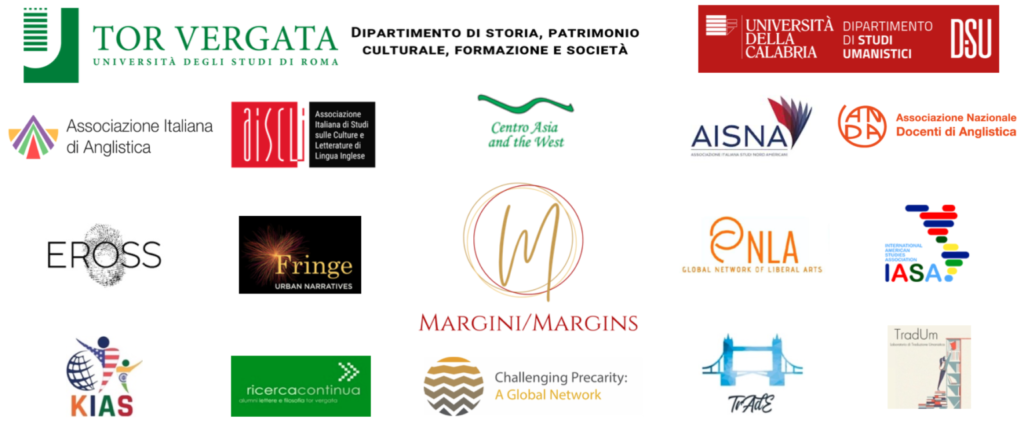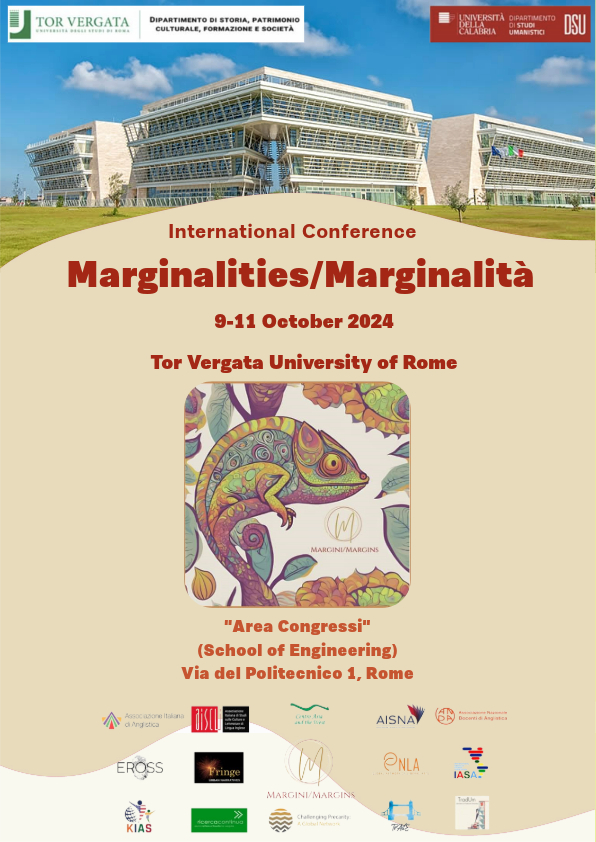

International Conference/Convegno Internazionale
Marginalities/Marginalità
9-11 October 2024 / 9-11 ottobre 2024
Università degli Studi di Roma Tor Vergata (IT)
Margins are the kingdom of change, transformation, fluidity, and (re)location. To stand on the margins is to be transgressive, interdicted, eccentric. To prefer the margins over the central/centralised dominant culture is to take up a space of resistance. Therefore, it is crucial to embody marginality and counterpower in order to construct, deconstruct, and reconstruct the complexity of reality.
Thinking and rethinking the borders means re-evaluating space from a geocritical perspective, combining language, identity, and setting representation – be it home, a rural or urban landscape, or even a digital or scientific/science-fiction space. Strictly connected with female writing, the household space, for instance, is remarkably ambivalent: a familiar place that provides protection but also requires it, the household often becomes a “prison”, and the inside-outside dialectic eventually leads to subversion dynamics. Because of the possibilities provided by semanticization, walls – namely, dividing lines between indoors and outdoors – become somewhat destabilising despite their function to support other elements and define space. Therefore, a house can also become a place of the eccentric and the unsettling, the so-called Freudian Unheimliche.
The notion of margin opens up a wide range of possibilities. Margins are frontiers that become a space of transition where different forces and individuals come in contact and alter their identities. As geographical borders, margins generate dividing lines that protect well-established political, social, and symbolic spaces. The crossing of borders, limits, and marginalities leads to issues of citizenship and belonging; and suffice it to think that some identities in movement, in the making, in transition, find it more complex to develop a sense of belonging towards a certain space, as well as to recognise themselves within it. Yet, crossing borders means opening a breech in the self, to enhance the possibilities for that self, to come to life once again.
The notion of margin opens up a wide range of possibilities. Margins are frontiers that become a space of transition where different forces and individuals come in contact and alter their identities. As geographical borders, margins generate dividing lines that protect well-established political, social, and symbolic spaces. The crossing of borders, limits, and marginalities leads to issues of citizenship and belonging; and suffice it to think that some identities in movement, in the making, in transition, find it more complex to develop a sense of belonging towards a certain space, as well as to recognise themselves within it. Yet, crossing borders means opening a breech in the self, to enhance the possibilities for that self, to come to life once again.
This international conference aims to foster interdisciplinary dialogues on the diverse linguistic, literary, and cultural manifestations that margins can assume within the Humanities.
Scientific Coordination:
-
- C. Bruna Mancini (University of Calabria, IT).
-
- Elisabetta Marino (Tor Vergata University of Rome, IT).
Scientific Committee:
-
- Giuseppe Balirano (L’Orientale – Università di Napoli, IT)
-
- Ratan Bhattacharjee (Dum Dum Motijheel College, IN)
-
- Leonardo Buonomo (Università degli Studi di Trieste, IT)
-
- Giuseppe Capalbo (Università degli Studi di Roma Tor Vergata, IT)
-
- Mariaconcetta Costantini (Università degli Studi “G. d’Annunzio” Chieti-Pescara, IT)
-
- Carla Fusco (Università degli Studi “G. d’Annunzio” Chieti-Pescara, IT)
-
- Patricia García (Universidad de Alcalá, ES)
-
- Jean-Philippe Imbert (Dublin City University, IE)
-
- C. Bruna Mancini (Università della Calabria, IT)
-
- Elisabetta Marino (Università degli Studi di Roma Tor Vergata, IT)
-
- Bilge Mutluay (Hacettepe University, AL)
-
- Alessandra Ruggiero (Università degli Studi di Teramo, IT)
-
- Daniela Carmen Stoica (“Fan S. Noli” University of Korçë, AL)
-
- Carla Tempestoso (Università della Calabria, IT)
-
- Janet Wilson (University of Northampton, UK)
Organising Committee:
-
- Giuseppe Capalbo (Università degli Studi di Roma Tor Vergata, IT)
-
- Marta Lucari (Università degli Studi di Roma Tor Vergata, IT)
-
- Elisabetta Marino (Università degli Studi di Roma Tor Vergata, IT)
-
- Virginia Pellegrini (Università degli Studi di Roma Tor Vergata, IT)
-
- Carolina Piccoli (Università degli Studi di Roma Tor Vergata, IT)
-
- Francesca Scaccia (Università degli Studi di Roma Tor Vergata, IT)
[UPCOMING] International Conference “Marginalities/Marginalità” (9-11.10.2024)
To download the Conference Programme in PDF format click here:
